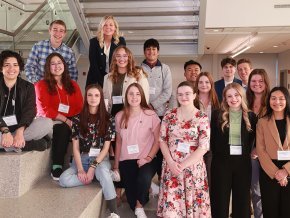Computer Science, B.S.
Be at the forefront of a rapidly-growing industry and on the cutting-edge of technology.
According to U.S. News, careers in computer science are among the best in the nation.
Courses are a mix of small assignments and larger team projects that focus in areas of computational science, operating systems, programming languages, computer architecture, system analysis and design, network security, data analytics, machine learning and artificial intelligence.
If you attended Catawba Valley Community College and obtained a degree in information technology, you may be eligible to transfer directly into this program.
Request Information
Take the next step toward completing your B.S. in Computer Science degree at Lenoir-Rhyne University.
Get StartedTake the next step toward completing your Bachelor of Science in Computer Science degree at Lenoir-Rhyne University.
Program Overview
LR's computer science program strives for academic excellence by offering rigorous courses designed to challenge the qualified and motivated student and to liberate the mind through an emphasis on quantitative and abstract reasoning, problem-solving, critical thinking and strong communication skills.
A major in computer science prepares students for positions in business, industry, education and graduate programs in computer science, information systems and information technology. The computer science major leads to a Bachelor of Science degree and includes courses that provide a balance between the development of science, mathematics and business-related applications. Available courses provide the necessary theoretical fundamentals for the study of algorithms, programming the design of computer systems and the application of computing to business and management. The wide variety of electives allows the student to tailor the major to theoretical computer science or to information systems.
Learning Outside the Classroom
Computer science majors have numerous opportunities to gain firsthand experience outside the classroom. Students are encouraged to take advantage of internships and mentor opportunities, allowing them to work with and learn from experienced computer science professionals. There are also opportunities to attend conferences that highlight new
developments and opportunities in the growing and exciting field of computer science.
Career Opportunities
Students who complete degrees in computer science generally have bright professional futures in a fast-moving field. As computing technologies continue to expand and evolve, professional opportunities will arise for individuals with expertise in developing and maintaining computers and computer systems. Opportunities exist across a surprisingly diverse array of professions:
- software engineering, programming and development
- systems and database analysis and administration
- computer and network engineering
- web development and application design
- quality assurance, software testing and cybersecurity
Students who can combine technical skills with the ability to communicate, collaborate, think critically and assess analytically will possess a distinctive advantage. Lenoir-Rhyne's rich integration of professional preparation with a deep grounding in the liberal arts provides an excellent model for professional practice.
One Year Practical Project
Before graduating computer science students have an opportunity to use their new skills in a one-year software development team capstone project.
As a student, you will have the ability to explore the inner workings of constructing a software program that will be used in the real world. You will also learn teamwork skills and how to interact with other software developers. This one-year experience can boost your résumé and provide powerful talking points when interviewing for a job after graduation.
In the fall semester, the year before graduating, a CSC-400 course covers methodologies that can be used when starting with an idea and then developing it into actual working software. Throughout the first four months, you will discover many intricate design and software engineering details involved in building programs.
In the following spring semester, the CSC 460 course gives you hands-on experience creating a complete set of working software. Your team meets with real-world clients and implements a software solution for their needs. Once you understand multifaceted requirements, the fun part of software development begins. This is a time when your team experiences the thrill and excitement of real project teamwork.
For many students, this is a lasting memory that stays with them for a lifetime and also provides an experience that helps them land that dream job.
Major Requirements
Computer science courses focus on computational science, operating systems, programming languages, computer architecture, system analysis and design, network security, data analytics, machine learning and artificial intelligence.
While in this major, there are many options to tailor your education. You can take electives in areas of your interest, as well as an optional one-year individual honors project on a topic of your choice. There is also an option to concentrate on Analytics and Machine Learning. This includes data visualization, artificial intelligence and advanced analytics such as neural networks, random forest, decision trees, clustering and much more.
NOTE: For students wishing to double-major in Computer Science and Information Technology, required courses for both majors must be satisfied, and at least 15 unique credit hours must be earned in the second major.
Honors
Students majoring in Computer Science who are judged qualified by the faculty may, upon invitation, elect to pursue honors work in Computer Science. To graduate "With Honors in Computer Science" students must have a minimum cumulative GPA of 3.0 and a minimum major GPA of 3.2. In addition, they must complete twelve credits of honors work in Computer Science, including an acceptable senior project, complete an original thesis to be submitted for approval of the faculty, and pass an oral defense of the research.
-
General Education Requirements (37 hours)
Graduation Requirements (4 hours)
- Technical Requirements (15 Hours)
-
Major Requirements (57-58 Hours)
- CSC 120 - Survey of Computing
- CSC 141 - Introduction to Java Programming
- CSC 150 - Computer Science I
- CSC 161 - Introduction to Analytics
- CSC 212 - Computer Architecture
- CSC 241 - Advanced Java Programming
- CSC 250 - Computer Science II
- CSC 260 - Analysis of Algorithms
- CSC 280 - Principles of Programming Languages
- CSC 312 - Operating Systems
- CSC 334 - Computer Networks
- CSC 350 - Database Management
- CSC 360 - Advanced Analytics
- CSC 400 - Systems Analysis and Software Engineering
- CSC 434 - Computer Security
- CSC 460 - Capstone Project
- CSC 475 - Comprehensive Senior Exam
Choose Two Courses from the Following (6-7 Hours)- CSC 163 - Introduction to Visual Basic
- CSC 210 - Ethical Issues in Information Technology
- CSC 220 - Introduction to Web Design
- CSC 291 - Introduction to Enterprise Systems
- CSC 320 - Client-side Web Programming
- CSC 341 - Application Development with Java
- CSC 420 - Server-side Web Programming
- CSC 491 - Project Management
- MAT 166 - Calculus II
- MAT 250 - Discrete Mathematics II
- MAT 280 - Linear Algebra
- MAT 415 - Applied Statistical Methods
-
General Elective Credits
(If Needed)
-
Total Credit Hours (Minimum) 128
On occasion, technical and/or program requirements may also meet specific core curriculum requirements. Please confer with your program advisor to determine which courses, if any, may be counted accordingly.
All Bachelors programs at Lenoir-Rhyne require at least 128 credit hours. If, in combination, core, technical, and program requirements do not generate at least 128 hours, additional credits must be completed to achieve 128 hours. These classes may be general electives, or a student may complete a minor or additional major.
Admission & Financial Aid
-
Undergraduate AdmissionOur admission team is here to assist you in making the college search process as easy as possible. Our counselors are happy to provide the information and guidance you need to submit your application, apply for financial aid and scholarships, visit and tour our campus.
-
Financial AidWe recognize that paying for college is a top concern for students and their families. Our financial aid staff is here to provide you with financial aid options and assistance to help you achieve your educational goals.
News & Events

12 LR students presented their research at the 2024 meeting of the North Carolina Academy of Sciences, earning awards and sharing the thrills of discovery.
View More
In the microbiology lab, Christina Fisher '25 investigates the antimicrobial potential of molds and fungi, and the accolades are adding up.
View More